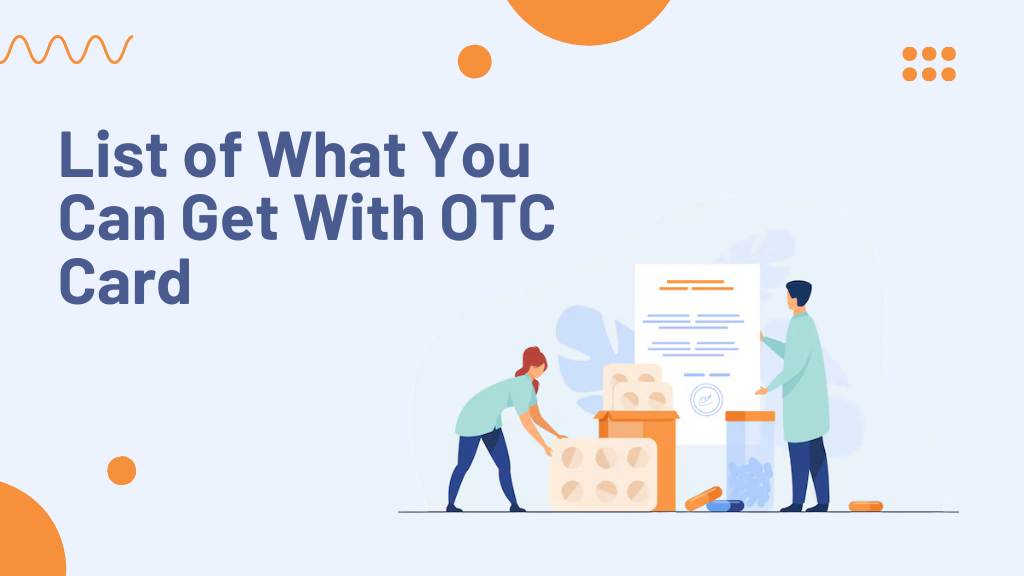An Over-the-Counter (OTC) card is one of the most valuable benefits offered by many Medicare Advantage and Medicaid plans. For countless individuals, especially seniors and those managing long-term health conditions, this card represents more than just a small convenience; it is an essential resource that makes healthcare and daily living more affordable. At its core, an OTC card works in the same way as a prepaid debit card. Members can use it to purchase approved health-related items at participating retailers, pharmacies, online stores, or even through mail-order services. By covering these everyday essentials, the card allows people to focus on maintaining their well-being without the stress of out-of-pocket costs.
For individuals living with chronic conditions such as diabetes, hypertension, or respiratory illnesses, or for seniors who want to maintain independence, an OTC card ensures that necessary products are always within reach. The benefit encourages preventive care and makes self-management of health far easier. If you are new to the concept of OTC benefits and wondering what you can actually purchase with the card, this guide provides a thorough explanation along with a detailed list of what you can get with OTC card, showing eligible categories and products while also highlighting how these items support overall wellness.
List of What You Can Get With an OTC Card
The list of what you can get with an OTC card is broad and designed to improve health, hygiene, and quality of life. These cards typically cover common over-the-counter medicines like pain relievers, cold and flu treatments, and allergy relief products, while also including first aid supplies, vitamins, and daily medical equipment. Members can also use them for dental care items, skin care products, vision aids, and personal hygiene essentials. Many programs even extend coverage to groceries, household cleaning products, baby care essentials, women’s and men’s health items, and mobility or safety aids. From everyday products like toothpaste, bandages, and soap to more specialized tools such as glucose meters, nebulizers, or orthopedic supports, the OTC card ensures individuals and families can meet their health-related needs without financial strain.
Detailed Explanation of What You Can Get With an OTC Card
The strength of an OTC card is its flexibility. It does not only cover traditional medicine but also supports preventive care, family well-being, and day-to-day living. The following sections provide a detailed breakdown of what is commonly available under this benefit.
Personal Health & Wellness Products
Personal health and wellness items are some of the most frequently purchased products using an OTC card. Many people rely on pain relievers such as acetaminophen, ibuprofen, and aspirin to address headaches, backaches, arthritis pain, and muscle discomfort. These medicines play a vital role in keeping daily life manageable. Fever reducers, often included in the same group, are equally essential because they help bring down temperatures in both children and adults during times of illness, reducing the need for unnecessary doctor visits.
Cold and flu medicines are also widely covered, allowing members to stock up on cough syrups, decongestants, and throat lozenges when seasonal illnesses strike. For those struggling with persistent coughs, products containing dextromethorphan provide nighttime relief, improving sleep quality and speeding recovery. People dealing with allergies can rely on antihistamines such as loratadine or cetirizine, along with nasal sprays and eye drops, which help minimize seasonal allergy symptoms affordably and conveniently.
Sleep aids are another important category, with melatonin supplements and diphenhydramine being popular choices for individuals struggling with insomnia. Digestive health products such as antacids, fiber supplements, stool softeners, and anti-diarrheal medicines are also covered. For people facing nausea, hemorrhoid discomfort, or smoking cessation challenges, specialized products such as nausea relievers, hemorrhoid creams, and nicotine replacement therapies are usually eligible as well. These items collectively ensure that individuals have easy access to solutions for everyday health concerns without additional financial stress.
First Aid & Emergency Care
Preparation for emergencies is an essential part of maintaining safety at home and while traveling. An OTC card helps members purchase first aid essentials, ensuring families are ready for cuts, scrapes, burns, or other minor injuries. Bandages of all sizes, from small adhesive strips to larger waterproof covers, are among the most common purchases. Antiseptic wipes, rubbing alcohol, and hydrogen peroxide are also important for cleaning wounds before applying protective coverings, while antibiotic ointments such as Neosporin promote faster healing and infection prevention.
First aid kits are often covered in full, providing a convenient collection of supplies in one package. For injuries that involve swelling or pain, hot and cold packs are available, while burn creams and gels provide immediate relief from household accidents. Thermometers allow families to monitor fevers accurately, which is especially important for children and older adults. More advanced items such as blood clotting powders, elastic bandages, wraps, and finger splints are also typically covered. Having access to these supplies means that families can handle most minor health issues at home, reducing the need for frequent urgent care visits.
Everyday Medical Supplies
For individuals with chronic illnesses or ongoing health concerns, everyday medical supplies are critical. OTC benefits often include blood pressure monitors, allowing patients to track readings at home and share results with their healthcare providers. For people managing diabetes, glucose meters, test strips, and lancets are covered, making consistent monitoring affordable and reliable.
Other devices such as pulse oximeters are particularly valuable for individuals with asthma, COPD, or other respiratory conditions, while nebulizers and related accessories help patients administer medications without leaving home. Heating pads, orthopedic supports, compression stockings, and incontinence supplies are equally important for comfort, mobility, and dignity. For seniors using hearing aids, coverage often extends to batteries, ensuring these devices remain functional without added costs. Collectively, these supplies empower individuals to monitor and manage their conditions from home, promoting independence and better long-term health outcomes.
Vitamins & Supplements
Preventive care is central to modern healthcare, and OTC cards play a vital role in making vitamins and supplements more accessible. Multivitamins are among the most popular purchases, as they provide essential nutrients for adults, children, and seniors. Older adults often benefit from calcium and vitamin D supplements, which are crucial for maintaining bone density and preventing osteoporosis.
Iron supplements are also commonly included, offering support for individuals with anemia or those who frequently experience fatigue. Immune-boosting products like vitamin C and zinc remain staples, especially during cold and flu season. Pregnant women can rely on prenatal vitamins, which are rich in folic acid, iron, and DHA, supporting healthy development for both mother and baby. Other widely covered supplements include omega-3 fatty acids, probiotics for digestive health, and herbal remedies like turmeric, echinacea, and ginseng. By making these products accessible, OTC cards help members strengthen immunity, prevent deficiencies, and maintain energy and vitality.
Dental & Oral Care
Oral health directly affects overall wellness, and many OTC programs recognize its importance by covering a broad selection of dental products. Toothpaste is a frequent purchase, ranging from fluoride varieties to specialized options for sensitivity or whitening. Manual and electric toothbrushes are also available, along with replacement heads for those who use rechargeable models.
Mouthwash options typically include antiseptic rinses for killing germs, fluoride rinses for strengthening enamel, and dry mouth formulas for added comfort. Dental floss, floss picks, and interdental brushes make it easier to maintain gum health and prevent plaque buildup. For those with dentures, products such as adhesives, cleansers, and storage containers are included, while dental guards for nighttime teeth grinding or sports activities are also commonly covered. These items collectively allow individuals to maintain healthier gums and teeth, while also reducing the risk of infections and other health complications.
Vision & Eye Care
Vision is closely tied to independence, safety, and quality of life. OTC benefits allow members to purchase affordable reading glasses in various strengths, which are particularly useful for age-related vision changes. Sunglasses with UV protection are also covered, helping prevent long-term eye conditions like cataracts or macular degeneration.
For those struggling with dryness, irritation, or allergies, lubricating and antihistamine eye drops provide quick relief. Contact lens users can purchase cleaning solutions, storage cases, and rewetting drops, ensuring proper hygiene and comfort. Eyeglass repair kits are often included as well, allowing members to tighten frames, replace nose pads, and maintain their eyewear affordably. These simple but essential products make it easier to protect vision health at every stage of life.
Skin & Personal Care
The skin is the body’s first line of defense, and caring for it properly is essential. OTC benefits usually include sunscreen lotions and lip balms with SPF, which protect against harmful UV rays and lower the risk of skin cancer. Moisturizers designed for sensitive or dry skin are also covered, as are medicated creams for eczema, psoriasis, or rashes.
Anti-itch creams like hydrocortisone and calamine lotion are available for bug bites and allergic reactions, while acne treatments containing benzoyl peroxide or salicylic acid help individuals manage breakouts. Wart removers, lice treatments for children, and hair regrowth products such as minoxidil are additional examples of covered products. These items provide both preventive and therapeutic solutions, ensuring that individuals can care for their skin and hair at home.
Household & Grocery Items
Some OTC programs extend their coverage beyond healthcare products, making room for household and grocery essentials. Canned vegetables, beans, tuna, and other low-sodium options are often eligible, as are high-fiber cereals like oatmeal and bran. Dairy alternatives such as almond or soy milk, along with nutritional shakes like Ensure, are covered in many plans. Protein powders, peanut butter, bottled water, and low-sodium soups are also frequently included.
Household hygiene products, including antibacterial soaps, disinfectant wipes, and hand sanitizers, are equally important for preventing the spread of germs. By including these products, OTC cards not only support personal health but also promote safer home environments.
Baby & Family Essentials
Families with young children also benefit significantly from OTC coverage. Baby formula, fortified cereals, and infant snacks are commonly eligible, ensuring proper nutrition during early development. Diapers, training pants, and baby wipes help parents maintain hygiene, while gentle skincare products like baby lotion and shampoo support infants’ delicate needs.
Other covered items include pacifiers, thermometers, and teething gels, which provide comfort and monitoring tools for babies. Children’s multivitamins in gummy, chewable, or liquid form are also available, supporting immunity and growth. This coverage eases financial strain on families while ensuring children’s health is consistently supported.
Women’s Health
Women’s health products are an important category within OTC coverage. Feminine hygiene items like pads, tampons, and pantyliners are included, ensuring privacy and comfort. Pain relief products such as ibuprofen and heating patches are available to reduce menstrual discomfort. Fertility and pregnancy-related products such as ovulation kits and pregnancy tests are also typically included. Prenatal vitamins, rich in folic acid and iron, provide critical nutritional support throughout pregnancy, benefiting both mothers and babies.
Men’s Health
OTC benefits extend to men’s health as well, with products like multivitamins designed for male nutritional needs, prostate support supplements such as saw palmetto, and grooming products including razors and shaving creams. Some programs even include testosterone-support vitamins, which help boost energy, stamina, and overall vitality.
Mobility & Safety Aids
For seniors and people living with mobility challenges, safety is a priority. OTC programs often cover canes, walking sticks, and accessories for walkers, including trays and glides. Reacher grabbers allow individuals to pick up objects without bending or straining, while slip-resistant shower mats reduce the risk of falls. Some programs also include bedside commodes for convenience. Medication management tools such as pill organizers, cutters, and crushers are also eligible, making daily health routines easier and safer.
Conclusion
The range of products available with OTC cards highlights their importance in modern healthcare, offering members a convenient way to access items that support their overall health and daily living. From basic medicines and first aid supplies to vitamins, over-the-counter remedies, nutritional supplements, grocery items, and mobility aids, these cards provide comprehensive support for health, nutrition, hygiene, and safety at every stage of life. By reducing financial stress and out-of-pocket expenses, OTC cards allow members to focus on preventive care, maintain independence, and achieve better long-term health outcomes. Understanding your plan’s offerings and reviewing the list of what you can get with OTC card ensures that you are fully aware of eligible products, from everyday essentials to specialized healthcare items.
FAQs
What is an OTC card?
An OTC card is a prepaid benefit card provided by certain Medicare Advantage and Medicaid plans that allows members to purchase approved health-related items without paying out of pocket.
Where can I use my OTC card?
These cards can usually be used at major retail stores, pharmacies, online platforms, and mail-order programs, though coverage varies by plan.
Can I buy groceries with an OTC card?
Yes, some plans allow the purchase of groceries such as low-sodium canned foods, cereals, nutritional shakes, and dairy alternatives.
Are vitamins and supplements covered?
Most OTC cards cover multivitamins, probiotics, protein powders, and certain herbal supplements, but eligibility depends on the specific plan.
Can OTC cards be used for family essentials?
Yes, many programs include baby formula, diapers, wipes, and children’s vitamins, making them highly supportive for families.





